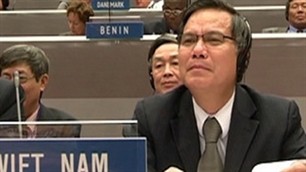Vietnam is now actively engaged in international trade and finance, creating a variety of opportunities and challenges. Ensuring Vietnam's national interests within the bounds of international law is an important challenge for the diplomatic sector, especially Vietnam’s diplomatic representatives overseas. This issue is high on the agenda of the on-going conference of Trade counselors in Hanoi.
 |
| A Vietnamese representative at the UN |
Vietnamese ambassadors, charge d’affairs, and trade counselors around the globe have returned home to attend the Trade counselors’ conference in Hanoi. Attendees are analyzing the current situation in Vietnam and the world and working out specific measures for Vietnam’s further integration internationally. In the context of Vietnam’s open market economy, in order to protect national interests and effectively implement the Party’s external policies, many diplomats say Vietnam needs better coordination between its ministries, sectors, and businesses.
Ambassador to the US Nguyen Quoc Cuong says diplomacy can help create a favorable environment but can’t do the work for businesses, whose internal strength is a decisive factor. Businesses must comprehend international rules to minimize their risks. Ambassador Cuong says: “I meet American businesses and associations every week, who want to know about investment opportunities in Vietnam. I have also talked to some Vietnamese businesses, but they don’t seem very active, especially during Vietnam’s negotiation to join the Trans-Pacific Partnership.” Cuong says only the Vietnamese Textile and Apparel Association has a representative involved in Vietnam’s negotiating team. Meanwhile, American businesses are lobbying their negotiating team to protect their interests. Cuong emphasizes that the more they participate the better they can protect their interests. He advises Vietnamese businesses to strictly abide by all local and international laws to be positioned to pulse any lawsuit.
Vietnamese Ambassador to Japan Nguyen Phu Binh says ambassadors and trade counselors should wisely analyze the local situation to identify Vietnam’s competitive advantages and organize trade and investment promotions. Binh says although Japan has suffered from last March’s earthquake and tsunami, it has remained a major market for Vietnam. If Vietnamese businesses can seize this opportunity to promote their commodities at reasonable prices, they can establish a firm foothold in this important market. Ambassador Binh says: “Japan can supply 40% of their own food consumption. We can increase exports of seafood to their market if we apply good quarantine practices. Investment will also be favorable as the Japanese Yen has inflated. After the disaster, the Japanese do not want to focus on domestic investment and they will be ready to pour money into feasible projects overseas. We have to enhance our competitiveness to attract more Japanese investment capital.”
Many diplomats noted that guest workers have contributed significantly to Vietnam’s economic growth. Vietnam has established cooperative mechanisms with many countries, but it will require closer cooperation among ministries and sectors to continue the good impression of Vietnamese workers abroad. Tran Trong Toan, Vietnamese Ambassador to South Korea says: “Vietnam has implemented various measures to educate workers sent to South Korea. Their relatives and local administrations are urged to do more to safeguard Vietnam’s export labor market.”
The Trade Counselor conference has collected practical opinions from Vietnamese diplomatic representatives which will aid the government’s international integration policies and raise Vietnam’s international status.
Anh Huyen